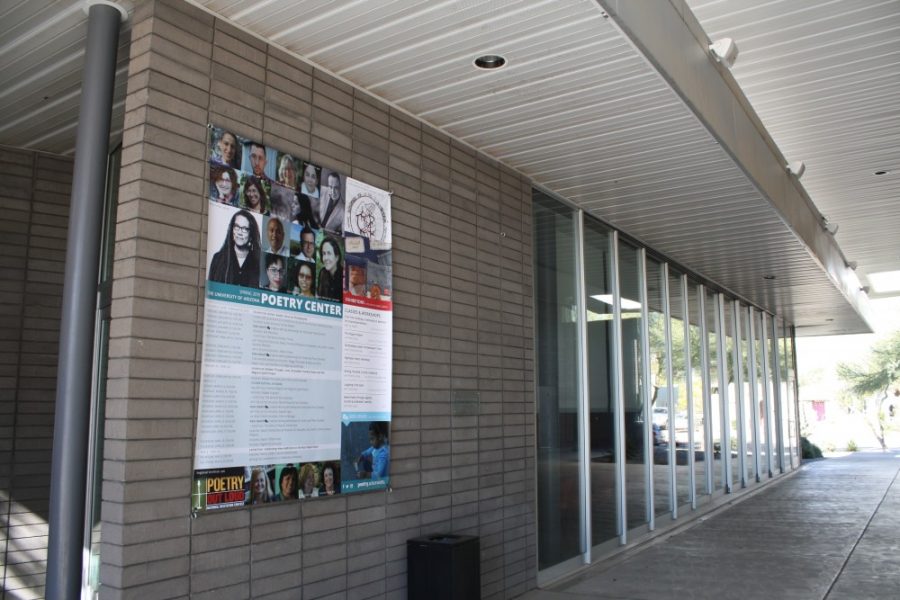The University of Arizona Poetry Center is using a new grant from the Art for Justice Fund to promote social justice through art.
The center is in its first year of a three-year project, supported by a $500,000 grant from the fund. According to Tyler Meier, the Poetry Center’s executive director, the project commissions poets to write pieces that bring awareness to mass incarceration and the justice system’s effects on racial minorities.
“In doing so, our goal is to create new art that will build public will for social change,” Meier said.
RELATED: One year later: The recovery of the stolen Woman-Ochre
The Poetry Center is one of over 60 recipients since 2017 that have been given grants by the Art for Justice Fund. The fund was created two years ago by philanthropist Agnes Gund, the Ford Foundation and Rockefeller Philanthropy Advisors to address mass incarceration in the U.S.
The Poetry Center will attempt to shed light on the experiences of people who are incarcerated and will help push for criminal justice reform through written pieces from the project.
“Art can change lives. If we hope to imagine a different future than the one we are headed towards, then we’ll need new ways of imagining,” Meier said. “Poetry can help provide new ways of bringing the world into words.”
The new project also has poets visit the Court Alternative Program of Education School at Pima Community Juvenile Detention. Lisa O’Neill, a writer and teaching artist, regularly teaches creative writing workshops for youth in juvenile detention. She also organizes visits through the Poetry Center where the writers commissioned by the Art for Justice grant teach incarcerated teens about poetry and how to improve their writing skills.
Last month, poet Nikky Finney was commissioned to write for the project and visited teens at the CAPE School with O’Neill.
“When she [Finney] came in, she came from a place of open-hearted compassion and listened to them and encouraged them,” O’Neill said. “It’s a beautiful, beautiful thing.”
The piece Finney, who is from South Carolina, wrote for the project was about George Stinney Jr. He was a 14-year-old black youth who was wrongfully convicted of murder in 1944 and executed by electric chair in Columbia, S.C.
Poet Randall Horton also visited the juvenile detention center and taught a writing class for minors in November as part of the Art for Justice project. Horton himself served in prison before becoming a writer and was able to relate to the experiences of the adolescents in detention centers.
“Having someone who was directly impacted in similar ways to them by the carceral system was so impactful for them. It was a big deal for them,” O’Neill said.
The Poetry Center has a history of connecting the art of poetry to the prison system.
Former UA professor Richard Shelton helped create a program which holds writing workshops for inmates in Arizona’s state and federal prisons.
Shelton said he got the idea to hold these workshops in 1970, after Charles Schmid, a serial killer in Arizona, sent a letter from prison asking Shelton to critique his poetry.
“The project also publishes an annual journal, the Rain Shadow Review, featuring work from writers currently or formerly incarcerated in Arizona,” Meier said.
Shelton started the literary journal as a way for current and former Arizona inmates to have their creative writing published. UA alumnus Ken Lamberton was one of the formerly incarcerated writers who was mentored by Shelton.
RELATED: Banned Band: The story of local ’80s punk band ‘UPS’
“I attended his prison workshops during my incarceration and then continued with him at the UA. We’ve become good friends over the 30 years — he is like a father to me — and we continue to get together every week to work on writing projects,” Lamberton said.
Lamberton has written several books since then and now helps Shelton run the workshop program.
A community workshop held at the Poetry Center gives ex-prisoners an opportunity to continue writing after they are out of prison.
“The workshop has always been open to the public, so we have an interesting mix of people, ex-prisoners, ex-prison workers, others involved with prison as volunteers,” Lamberton said.
Lamberton said writing gave him his life back when he went to prison and he hopes it will do the same for others.
“In a place that only looks backward, only rubs your face in your past mistakes, writing allowed me something to look and work forward to,” Lamberton said. “It gave me a voice among the voiceless, and this is what writing does for others behind bars.”
Follow Jesse Tellez on Twitter









